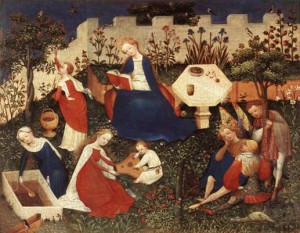
“The Little Garden of Paradise”–believed to have been painted between 1410 and 1420 by an anonymous German painter known as the Upper Rhenish Master–was inspired by Song of Solomon.
Though written in approximately 5th century B.C., a somewhat lesser known book in the Bible can help readers understand the intensity of the basic human desire of another. “Song of Songs,” sometimes called “Song of Solomon,” is often left out of biblical discussion because the writings deal less with traditional biblical do’s and don’ts than with human desire and sexuality, a subject of struggle in some of today’s Christian churches.
Dr. Christina Bucher, Elizabethtown College’s Carl W. Zeigler Professor of Religion and the Department of Religious Studies department chair, talks about “Christianity, Eros and the Song of Songs” at 7 p.m. Tuesday, Feb. 4, during the College’s Faculty Scholarship Series lecture held in the Susquehanna Room of Myer Hall.
Song of Songs is about human love and expresses it positively in a way that we don’t usually find in the Bible.”
For two thousand years, this Old Testament biblical book has been read by Jews and Christians as a theological witness to God’s love for God’s people. More recently, however, biblical scholars have come to believe that Song of Songs is a collection of poems specifically about human sexual desire. The question remains: Were these love poems, created purely at a human level, brought into the Bible because readers, uncomfortable with their truth, interpreted them theologically?
“A lot of intertextual connections between this and other parts of the Bible suggests to me that the theological reading came about before it was pulled into the Bible,” Bucher said.
Bucher said she was asked to write for a biblical commentary series, but with Hosea, her first book of choice already assigned—she wrote her doctoral dissertation on Hosea’s husband-wife imagery—she opted for Song of Songs. “I wanted something more uplifting than Hosea,” Bucher said. “Song of Songs is about human love and expresses it positively in a way that we don’t usually find in the Bible.” Most discussion of human interaction contained in the Bible, Bucher said, is about what you can and can’t do. “The rest of the Bible doesn’t have much to say about human sexual desire.”
Bucher, who earned her bachelor’s degree from Elizabethtown College in 1975, her master’s degree in theology from Bethany Theological Seminary in 1977 and her doctoral degree in religion from Claremont Graduate University in 1988, said she was in college before she read the Song of Songs. “I grew up not really knowing that book was in the Bible,” she said. “I was college age before I realized it was an influential book in art and literature and music.”
In the Middle Ages Song of Songs was used to describe the love between Mary and her son. “It can be shocking to some to see them as lovers,” the professor said. “But it is understood that, symbolically, Mary represents the church. Jesus didn’t literally have a sexual relationship with his mother.” During the Renaissance period Song of Songs inspired paintings of Mary, seated in a closed garden, often holding the infant Jesus in front of her. The closed garden depicted purity and protection.
Throughout time, the eight chapters of Song of Songs, one of the shorter books in the Bible, have been read and understood on many levels of symbolism. It was not appreciated as simply poetry about human love and desire.
Mystics, who are all about the religious experience, believe Song of Songs expresses the desire for a God; other Christians read it as God’s love for humankind, Bucher said. At face value, however, “you would never think this is about God. It seems to be about a man and woman’s love for each other, their desire, admiration and their separation,” she said.
“Some are shocked to find Song of Songs in the Bible,” Bucher added. “The only way to redeem it is to say, ‘Oh, it’s about God’s love’.” Even today, human sexuality in many churches is off limits. “Some still feel that sex and religion should be kept separate,” she said, noting that this is why some churches are now having difficult discussions about sexuality.
When asked by Dr. Susan Traverso, the College’s Provost, to offer a lecture for the Faculty Scholarship Series, Bucher knew this biblical book would be her topic of conversation. “I’ll talk about the importance of how the expression of human desire should come into a church’s conversations on human sexuality, said Bucher, who counts the discussion of “love as strong as death” in chapter eight as a favorite. “This is not a book of do’s and don’ts. It reveals real human desire.”
The lecture is free, with a reception preceding at 7 p.m. Contact: Nancy Kaufhold at kaufholdn@etown.edu or 717-361-1416.

